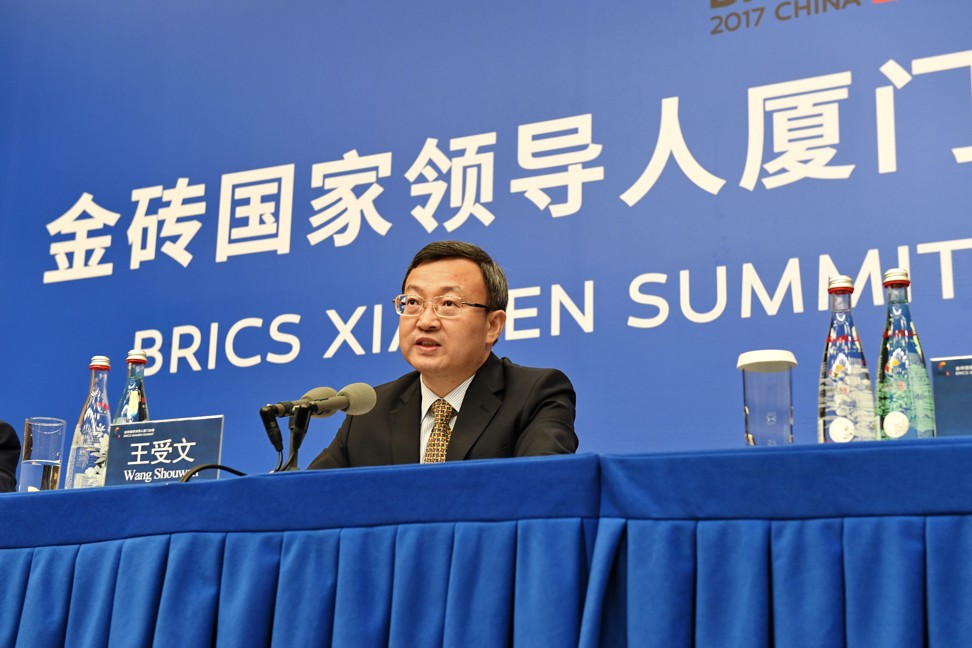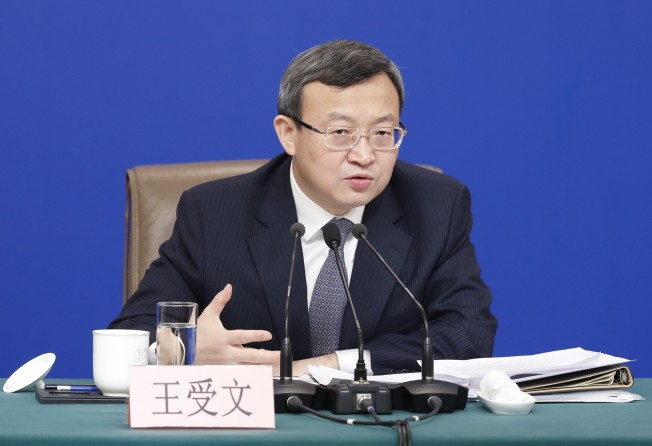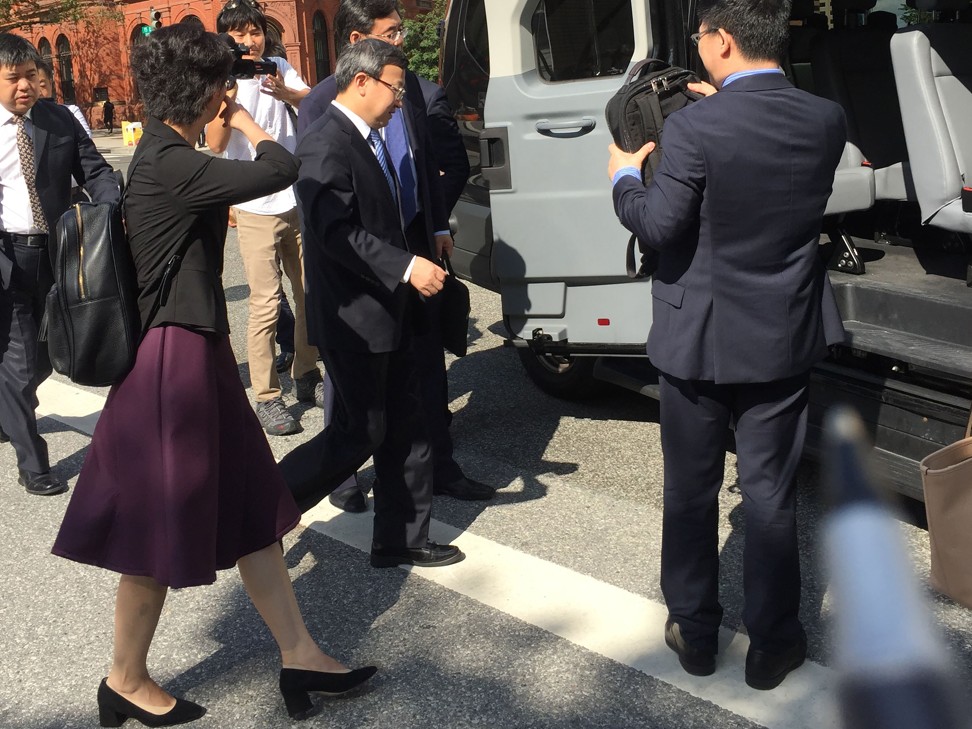
Wang Shouwen, China’s former ‘foot soldier’ now promoted to ‘general’ in US-China trade talks
- The vice-commerce minister is Vice-Premier Liu He’s deputy and chief translator in the trade talks with the likes of US trade representative Robert Lighthizer
- The 53-year-old has spent the majority of his 30-year career focused almost entirely on Chinese foreign trade

Wang Shouwen, the top deputy in China’s trade negotiation team, remained silent over the specifics of the ongoing US-China trade talks earlier this month, instead choosing to reveal details of the lunch menu Vice-Premier Liu He shared with his US counterpart.
Liu opted for the traditional American staple, the hamburger, while US trade representative Robert Lighthizer chose Asian-style stir-fried chicken with eggplant. The two skipped tea or coffee and drank boiled water, a Chinese custom.
This was a clear sign of Beijing and Washington’s shared goal to find common ground in the trade talks, Wang insisted.
The practised way that Wang disclosed selective information that advances a negotiation, while holding back technical details that may still be in dispute, has helped the 53-year-old move up the ladder from junior official at the then Chinese foreign trade ministry in 1989 to Vice-Commerce Minister over the last three decades.

From his prominent position inside one of China’s most powerful ministries, Wang is at the centre of talks that will influence the country’s economic future and future relations between the world’s two largest economies.
While Wang is not Beijing’s top negotiator in the high-stakes talks with the United States, with that honour falling to Liu, his rich experience in tough disputes and his skills in drafting the delicate wording of a trade agreement text have made him a natural heavyweight across the table, according to analysts and the people who know him.
“Wang is a capable cadre with a solid performance in different posts,” said one source close to China’s Ministry of Commerce. “He is particularly skilled in negotiations, having started participating in talks more than 10 years ago.”
His career has paralleled the explosive growth in Chinese trade, with China still an economic backwater with tiny trade flows back in 1989 when the trade ministry’s foremost mission was to boost Chinese exports to earn the hard currency needed to pay for the country’s imports.
In the 30 years that followed, China gradually emerged as a formidable trading power, while Wang climbed the bureaucratic ladder within the ministry. Apart from two brief stints in Tibet and Nanjing – postings that were necessary preconditions for promotion – his service in China’s foreign trade ministry saw seven ministers, including Wu Yi, the famed “Iron Lady of China,” and Bo Xilai, the disgraced former Chongqing party boss who headed the ministry for five years, come and go.
His is a genuine story of growing from a foot soldier into a general. Wang has no special family background or political blessing. He earned his way up by being a capable technocrat.
“His is a genuine story of growing from a foot soldier into a general,” said a person who knew Wang in early years but did not want to be named. “Wang has no special family background or political blessing. He earned his way up by being a capable technocrat.”
Even though the Anhui province native had no experiences living or studying abroad, Wang is regarded as one of the best English interpreters in the ministry, possessing an ability to hop back and forth between Chinese and English while dealing with complex legal terms and jargon – a skill that Liu relies upon when talking to talented negotiators like Lighthizer, a trade lawyer and government trade official for more than four decades.
Wang has long served as a strong and skilful defender of Chinese exporters. In the first years after China’s entry into the World Trade Organisation in 2001, Chinese labour-intensive product exports surged, triggering a wave of anti-dumping investigations from trading partners. Wang, who served as the chief of the fair trade bureau and the director of the foreign trade department at the ministry, led efforts to develop China’s first trade warning system to help domestic manufacturers to defend themselves in anti-dumping cases.
Wang has been particularly successful in defending China’s domestic industries against foreign threats. When China’s textile exporters were hit hard by the global financial crisis in 2008, putting 400,000 jobs at risk, Wang warned officials of the incoming Obama administration not to retaliate against Chinese trade.
“If the new US administration employs protectionist trade measures, it could produce difficulties for China, and the Chinese side might have to take action,” he was quoted as saying in a US diplomatic cable revealed by WikiLeaks. The Obama administration did not retaliate.
When Beijing and Washington quarrelled over Chinese subsidies to its domestic steel industry, which had helped create massive overcapacity, Wang led the bilateral dialogue with Washington, rejecting the US demand that China cut financial support for steel firms and reduce overall industry capacity. Since then, China’s total steel output has more than doubled, although China’s steel exports to the US shrank by about two thirds in the same period.
The trade talks with US President Donald Trump’s trade envoys, however, have proved much more challenging that previous dispute, testing the skills of the entire China negotiating team. Zhong Shan, Wang’s boss at the Commerce Ministry, described the talks as “very difficult” and “very exhausting”.

Wang’s visit to Washington in August did not stop the trade war from escalating, with the US deciding to proceed with tariffs on US$200 billion worth of Chinese products a month later. Wang later said that it was impossible to have serious talk when there is “a knife to our throat”.
But perseverance may be about to pay off, and after many rounds of exchanges in the form of face-to-face meetings and teleconference calls since the summit between Trump and Chinese President Xi Jinping in Buenos Aires in December, Chinese and US negotiators continue to inch closer to a deal, although the possibility that there will be no deal cannot be ruled out.
Mark Williams, chief Asia economist of Capital Economics, said a deal will hinge on China’s ability to address Trump’s demands while avoiding “anything that could be perceived in China as an unequal treaty’”
Wang, at least publicly, remains optimistic, saying last week that he sees hope for a deal soon.